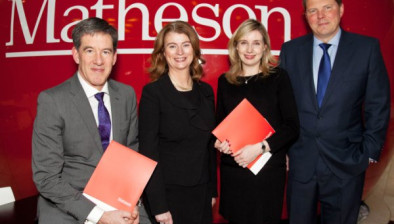Matheson briefing hears Brexit views from EU commissioner Phil Hogan

Matheson welcomed EU Commissioner Phil Hogan as guest speaker at its most recent Leadership Series Brexit briefing in Dublin.
The event provided a forum for senior industry stakeholders and Irish business leaders to discuss current Brexit political, legal and economic dynamics. It focussed on the progress of the Brexit negotiations, key withdrawal and transition issues, together with specific Irish impacts.
Mr Hogan shared his views on the British political landscape and challenges; the EU political landscape; and the Irish border question, with a Q&A session chaired by Matheson’s managing partner.
Mr Hogan highlighted the delicately-balanced parliamentary situation in the House of Commons, the related importance of the upcoming local elections in England on Thursday, and the continued robust support from the EU and its member states on the Irish border question.
Dan O’Brien, chief economist at the Institute of International and European Affairs, also contributed to the event, providing an overview of Ireland’s current economic position in the context of Brexit.
Michael Jackson, managing partner at Matheson, said: “Economically, legally and politically, Brexit will have substantial and long-term implications and impacts for the future relationship between the UK and the EU, including Ireland. With less than a year to the expiration of the two-year period prescribed by Article 50, uncertainty as to the outcome of the nature of that future relationship persists.
“In the absence of the necessary clarity around Brexit, businesses, and particularly regulated businesses for which an EU passport is important, have no option but to prepare for a hard Brexit as recommended by Michel Barnier this week. While we at Matheson continue to hope that there will be a withdrawal agreement providing for a soft Brexit and a transition period will be achieved, we have for some time at the firm been advising clients to prepare for the worst case scenario of a hard Brexit. This includes securing their long-term ability to access European markets beyond Brexit and assisting many financial institutions with their regulatory applications and Central Bank engagement.”










